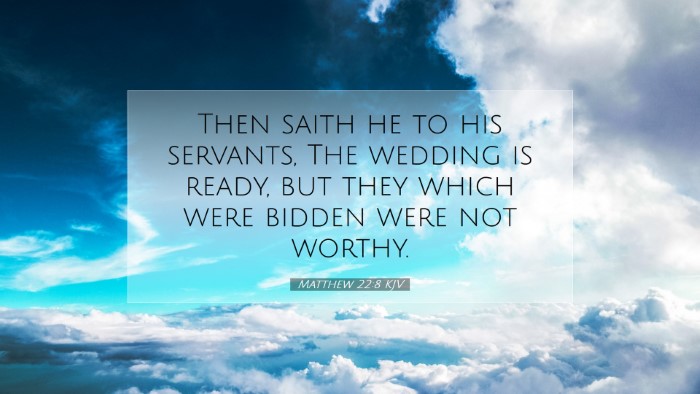Commentary on Matthew 22:8
Matthew 22:8 states, "Then said he to his servants, The wedding is ready, but they which were bidden were not worthy." This verse comes from the Parable of the Wedding Feast, illustrating the Kingdom of Heaven's invitation and the responses of those invited.
Introduction
This parable emphasizes both the readiness of God's kingdom and the unworthiness of those who reject His invitation. The original guests represent the Jewish nation, while the servants symbolize the prophets who were sent to call them. The weight of this verse lies in understanding both the judgment of God and the gracious offer extended to all.
Insights from Public Domain Commentaries
Matthew Henry's Commentary
Matthew Henry remarks on the significance of the wedding feast as an allegory of Christ’s coming and the joyful acceptance of His kingdom. He notes that:
- The invitation signifies God’s grace, calling people to partake in the joys of salvation.
- Those originally invited (the Jews) were unresponsive and thus deemed "unworthy."
- The servants represent the prophets and the apostles who call all to repentance and faith.
This concept of unworthiness is critical; it illustrates that self-righteousness and lack of faith will exclude one from God’s kingdom.
Albert Barnes' Commentary
Albert Barnes provides additional clarity on the significance of “not worthy.” He emphasizes that:
- This statement reflects moral and spiritual unworthiness; the invited had the opportunity yet chose to ignore the call.
- The rejection of the invitation highlights the seriousness of rejecting God’s grace and the dire consequences of such decisions.
- Barnes connects this verse with the broader theme of the Jewish rejection of Jesus and the subsequent opening of the kingdom to the Gentiles.
In observing the responses to God’s call, Barnes encourages readers to examine their hearts for any indifference toward divine invitations.
Adam Clarke's Commentary
Adam Clarke elaborates on the cultural implications of acceptance and rejection regarding wedding feasts in ancient times. He notes:
- In biblical times, declining an invitation to a feast was a significant offense, illustrating the gravity of the invited guests' unworthiness.
- Clarke sees the "servants" as a divine representation, emphasizing God’s persistence in reaching out to those willing to receive His invitation.
- The phrase “were not worthy” serves as a somber reminder that rejection of God’s call carries severe spiritual repercussions.
Clarke encourages a reflection on personal responses to God’s invitations and the necessity of earnest engagement with spiritual truths.
Theological Implications
The theological implications of Matthew 22:8 extend far beyond the immediate context. At its core, it speaks to:
- The Nature of God's Invitation: God’s invitation is universally extended, yet not all accept it. The nature of divine grace is free and open to all.
- The Accountability of Those Invited: The uninvited guests illustrate mankind's tendency to reject divine grace in favor of worldly pursuits.
- Judgment and Grace: The balance of grace offered and judgment pronounced illustrates God’s character; His mercy calls, yet His holiness demands a response.
Practical Applications
For pastors, students, and theologians, Matthew 22:8 provides critical lessons:
- Emphasize Evangelism: The servants in the parable represent the Church's mission to proclaim the Gospel, reminding believers to actively invite others to Christ.
- Self-Examination: This verse invites personal reflection on how one responds to God’s invitations and the importance of maintaining a heart of humility and readiness.
- Understanding Unworthiness: Recognizing unworthiness should lead to a deeper appreciation of grace, encouraging believers to foster gratitude and urgency in sharing the Gospel.
Conclusion
In summary, Matthew 22:8 encapsulates the vital truths of invitation, rejection, and the nature of God’s kingdom. Understanding this verse through the perspectives of Henry, Barnes, and Clarke provides a rich tapestry of theological and practical insights for engagement in ministry and personal faith.


